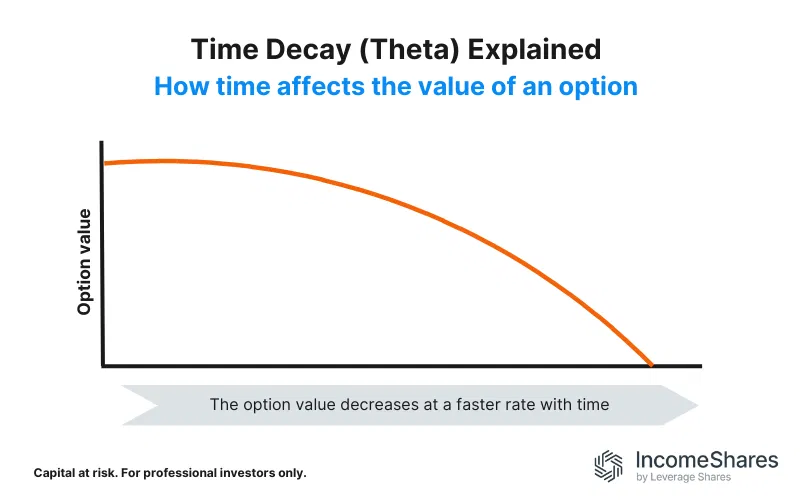.webp)
Author
Jonathan Hobbs, CFA
Date
27 Nov 2024
Category
Market Insights
Time Decay Explained: How Theta Impacts Options Trading
Your capital is at risk if you invest. You could lose all your investment. Please see the full risk warning here.

Time decay (also called theta) is a crucial concept in options trading. It refers to how an option loses value as it gets closer to its expiration date. This loss in value happens because there’s less time for the underlying stock or index to move in a way that makes the option profitable. The closer you get to expiration, the faster this decay happens.
What is time decay (theta)?
When you buy an option, part of its price comes from the time remaining before it expires. The more time left, the more valuable the option (all else being equal). That’s because there’s a better chance for the stock price to move in your favor (“in the money”). In other words, there’s more time for your option to move from “out of the money” to “in the money”.
But as time passes, that chance decreases, and the option loses value. It becomes more likely that your option will expire “out of the money”. This is time decay in action.

How does time decay work for options buyers and sellers?
Let’s break it down simply:
For buyers: Time decay is your enemy. As time passes, the value of your option erodes – even if the price of the stock doesn’t change much. If the option doesn’t reach its strike price before expiration, you lose the premium (the upfront cost you paid).
For sellers: Time decay is your friend. Each day that passes without the option reaching its strike price means the premium becomes more likely to stay in your pocket. As the option gets closer to expiring, it’s less likely the buyer will exercise it.
Why does theta speed up as the expiration approaches?
The rate of time decay speeds up as you get closer to the expiration date. For example, if you buy a 30-day call option, the value might not drop too quickly in the first few days. But in the last week before expiration, the value drops significantly because there’s barely any time left for the option to make a profit. This is why short-term options (like 0DTE options) are really sensitive to time decay.
Example: Call option on stock XYZ
Let’s say you buy a call option on stock XYZ that expires in 30 days, with a strike price of $100. You pay $5 in premium for the call option.
Over the first 15 days, the stock doesn’t move much, and you notice the premium drops to $3 due to time decay alone. If the stock doesn’t start moving in your favor soon (i.e. in the money), the premium will keep dropping, potentially reaching $0 by expiration.
How to use time decay to your advantage
Selling options: Traders often sell options to collect premiums, knowing time decay works in their favor. Each day the stock price stays below the strike price (for calls) or above it (for puts), the seller benefits from time decay.
Longer expiration dates: If you’re buying options, you can manage time decay by choosing longer-dated options. The further away the expiration, the slower the time decay.
Avoid last-minute option buys: Buying options too close to expiration is risky because time decay eats away at the value faster. Unless you expect a big price move soon, it’s usually better to avoid short-term options if you’re a buyer.
Final thoughts
Time decay is an important concept in options trading. It can erode the value of an option over time, especially in the days leading up to expiration. Understanding how time decay works can help you make smarter choices when buying or selling options – whether you’re looking to hedge your portfolio or generate income from premiums.
Key takeaways
- Time decay (theta) is the gradual loss of an option’s value as it nears expiration.
- It negatively affects option buyers but works in favor of option sellers.
- The closer an option gets to expiration, the faster time decay accelerates.
- Selling options is a common strategy to benefit from time decay and collect premiums.
Your capital is at risk if you invest. You could lose all your investment. Please see the full risk warning here.
Related Products:
Strategie
Barbesicherte Puts + Eigenkapital
Ausschüttungsrendite
36.31%
Strategie
Barbesicherte Puts + Eigenkapital
Ausschüttungsrendite
43.42%
Strategie
Barbesicherte Puts + Eigenkapital
Ausschüttungsrendite
71.03%
Strategie
Barbesicherte Puts + Eigenkapital
Ausschüttungsrendite
47.27%
Strategie
Covered Call
Ausschüttungsrendite
13.51%
